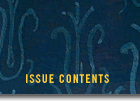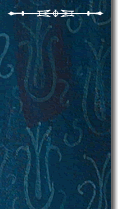


 |
 |
|
Around Tappan Square :: Page 1 :: Word of Mouth
Jump to Page >1< : 2 : 3 : 4 : 5 : 6 : 7 : 8 : 9 : 10 of ATS
Word of Mouth
Jonesing for a lesson in linguistics? Read on!
by Katie Hubbard ’05
Illustrations by Megan Berner
What better place to study the dynamic nature of language than within a student body known for challenging boundaries? It was this sort of thinking that convinced Robert Longsworth, emeritus professor of English, to publish his collection of “Obie-speak” colloquialisms —nearly 1,000 student-derived, Oberlin-inspired words
 An
Obie endeavor through and through, A Decade of Campus Language at Oberlin
College is a 10-year compilation of dictionaries generated by students
in Longsworth’s popular course, The History and Structure of
the English Language.
An
Obie endeavor through and through, A Decade of Campus Language at Oberlin
College is a 10-year compilation of dictionaries generated by students
in Longsworth’s popular course, The History and Structure of
the English Language.
“I wanted to make the study of language more real to my students,” he says. “Identifying words specific to the campus community was a way to involve them actively in the process that changes and creates language.” Students, thus, were required to submit words unique to Oberlin, including their tense, meaning, and usage.
Any Obie could see the fun in this; who else would understand the sentences, “She’s a Connie who lives in da scum,” or “Those Harkies put hippie dust on everything”?*
Chris LeCluyse ’95, an instructor and writing training specialist at the University of Texas, annotated and published the first Obie-speak dictionaries as a winter-term project in 1993. An instant success, the guide was sold at the Co-op Bookstore and distributed to first-year students for several years. “My work with the dictionary project profoundly influenced my scholarship and teaching,” says LeCluyse, who conducted a similar project with his own students at UT. His favorite Obie-ism? “Birkturf,” he says. “Ground that is particularly comfortable to walk on in Birkenstock sandals.”
College students, says Longsworth, are important cultural catalysts. “College is one of the few places where a relatively heterogeneous population of people comes together for a similar purpose. College life becomes a breeding ground for word additions and changes.”
While some of the terms, such as the ’Sco and womb chair are recognizable year after year, others, such as elephant snot (a 1990 addition that refers to the sticky blue substance used by residents of South Hall to hang posters), leave the scene fairly quickly. A few words, such as fussers—the nickname for the Oberlin College telephone directory—have been in circulation for decades. (The term came about near the end of the 19th century, when a fusser referred to a flirtatious male student.)
Most of the words, however, postdate the 1960s, a trend Longsworth attributes to the radical reshaping of the undergrad-uate college in the ’60s and the dis- appearance of many old-fashioned rules.
“If you examine the number of words related to a particular topic and how they change from year to year, you see the way language takes on social and political change, or addresses current issues,” he says.
 Case
in point: LGBTU (the acronym for the Lesbian, Gay, Bisexual, Transgen-dered
Union) first appears in the 1999 dictionary, as does LMNOP, “a
jocular (and mildly disparaging) name for the LGBTU.” The
appearance later of numerous slang terms referring to sexual orientation
illustrates “the openness with which people began to speak about
sexuality on campus,” says Longsworth.
Case
in point: LGBTU (the acronym for the Lesbian, Gay, Bisexual, Transgen-dered
Union) first appears in the 1999 dictionary, as does LMNOP, “a
jocular (and mildly disparaging) name for the LGBTU.” The
appearance later of numerous slang terms referring to sexual orientation
illustrates “the openness with which people began to speak about
sexuality on campus,” says Longsworth.
Although the book is marketed by Mellon Press as a scholarly study of
linguistic change, its primary audience may be Obies who find a trip down
memory lane enticing. Where else would one find such a colorful palette
of words, including intellectual orgasm, Moons for Goons, crunchy,
and snail room?**
:::::
*Translations: “She’s a Con student
living in Dascomb Hall” and “Those Harkness Co-opers put nutritional
yeast on their food.”
**A sarcastic description of intensely intellectual
conversation; Geology 118: Planets, Moons, and Meteorites; displaying
interest in the outdoors and environment, characterized by long hair and
bare feet; student mail room in Wilder Hall.
:::::
Do You Speak Obie? (the) Ministry n. name for the large white house at 36 E. Lorain that is rented by students. The building was “formerly known as The Ministry of Truth and is remarkable for the enormous cross that is propped on one of the lower front roofs.” Hobart 1. n. name for either of two different appliances made by Hobart Company and used in co-ops: one, a large-capacity dishwasher; the other, a food preparation machine with several functions (mixing, shredding, cutting, etc.); 2. v. to use either of these appliances, as in “I’m going to Hobart the carrots;” 3. v. to wash dishes with the Hobart dishwasher, as in “It’s your turn to Hobart.” Log jam n. a recent graduate of Oberlin who is still living in Oberlin; an acronym, from “Lazy Oberlin Grads Just Aren’t Motivated.” Fairchildy adj. used to describe any relatively bland, tasteless food (from the veganness of the food prepared at Fairchild Co-op). |
![]()